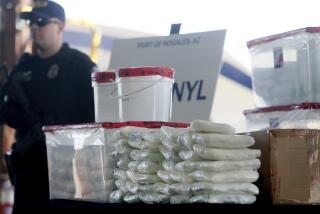Colombia’s Anti-Drug Plan Wins $621-Million Pledge
MADRID — International donors pledged $621 million Friday to help fund Colombia’s multibillion-dollar project to combat cocaine production and revitalize the country’s economy.
Colombia is trying to gather $3.5 billion from foreign donors to add to its own contribution of $4 billion to the project, which includes plans to beef up military action against the drug trade, protected by Colombia’s powerful rebel movement.
The pledges from the one-day conference, which was attended by 27 nations and several international agencies in Madrid, “forms the first contribution from the international community to the peace process,” said Enrique Iglesias, head of the Inter-American Development Bank, which is presiding over the Colombia Plan.
Spain offered $100 million, while Japan will donate $70 million. Norway will provide $20 million.
The United Nations will provide $131 million, while the Inter-American Development Bank and the Andean Corporation for Development will jointly contribute $300 million.
The European Union said it would announce its contribution at the next meeting of supporting nations, scheduled for September in the Colombian capital, Bogota. Other countries said they would make their donations over the coming months.
Separately, the U.S. delegation to the Madrid conference said Washington is contributing $250 million to social development and alternative crop development in Colombia.
That money comes from a $1.3-billion aid package already approved by the U.S. Congress for the Colombia Plan, announced in September by Colombian President Andres Pastrana.
U.S. State Department spokesman Richard Boucher welcomed Spain’s contribution to the anti-narcotics program, saying the administration is “especially grateful” not only for the pledge but also for Spain’s role in hosting the conference.
He praised other European countries for their positive responses at the conference.
“The conference has been a huge success,” said Colombian Foreign Minister Guillermo Fernandez de Soto. “The presence of 26 countries and other institutions showed international solidarity with our peace process.”
When asked whether most of the aid would go to bolstering the Colombian military, he said that at least half the funding would go toward social and economic recovery.
“This is a plan for peace that looks to strengthen the state’s capability to combat narcotics,” he said.
Foreign Ministry officials from the 15 European Union countries joined nations such as Japan, Brazil and Canada at the meeting, as did the representatives of Inter-American Development Bank, the International Monetary Fund, the United Nations and the European Commission.
More to Read
Sign up for Essential California
The most important California stories and recommendations in your inbox every morning.
You may occasionally receive promotional content from the Los Angeles Times.










